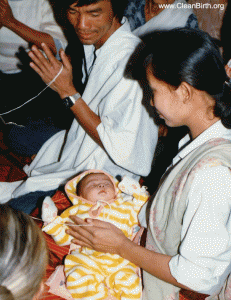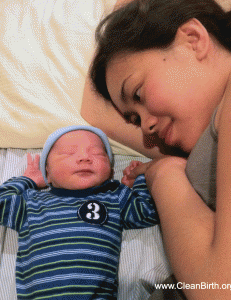
One of the most anticipated moments of my life was the birth of my first son in 2011. His arrival would not only make me a first time mother, but it would also usher my parents into a new phase of their lives ‑ grandparenthood.
My mother and father immigrated from Laos in 1986. Since then, they’ve settled into a comfortable, busy life in their adopted country. But their hearts have always been in their first home ‑ Laos. And so, I grew up half-cultured, juggling traditions from countries half a world apart. English and Lao words tangled in conversation. Christmas gifts were exchanged in December, and the pbeemai (New Year) celebrated in April. Meals combined Eastern and Western foods before fusion was trendy. Lao and Canadian culture have always co-existed in my world, though I found myself favouring one over the other at different points in my life. When I became pregnant, it was my Lao identity that resonated with me the most.
The months of my first pregnancy flew by. As my belly grew bigger, my birth plans began to take shape. For inspiration, I looked to the birth story I’d heard countless times over the years ‑ my own.
When asked about her first labour, my mother has always said, “Long. So painful.” After twenty-two hours, she birthed me without drugs and minimal medical intervention. The cord was wrapped around my neck; we both nearly died.
This story always frightened me, but it also made me realize how tough my soft-spoken mother is. I hoped that when my time came, I would find the same strength. With my midwife’s blessing, I planned for a home birth. Friends and strangers alike encouraged to “just get the epidural”, but I figured that if my mother could get through childbirth naturally, then surely I could too.
My son decided to come nearly three weeks early, during the biggest thunderstorm of the year. My husband was the first to guess I was in labour. It took nearly half a day of random contractions for me to admit that he was right. As the day drew to a close, early labour melted into active labour. Our doula had showed us several pain management techniques during pre-natal classes. As the contractions intensified, however, all I could remember was a Buddhist prayer my father had taught me years ago. A string of short, simple words he’d gifted to his children to ease times of worry or despair. I recited them, swaying to their rhythm, attempting to cope with the same sensations my mother felt while bringing me into the world.
Labour progressed rapidly as the hours passed. My doula arrived in the dead of the night. She and my husband followed me as I walked from room to room, breathing through contractions, each one more intense than the last. Eventually, I settled below a framed photo of my mother. She was wearing a sihn (a Lao skirt), holding me as a baby during my sou khuan (blessing ceremony). My father sat beside her, beaming at his new daughter. I had chosen to birth at home, knowing that a hospital would surely distract me from my goals of achieving a natural birth. By that point, I was desperate for any kind of pain relief. But that photo of my mother, who had just recently given birth herself, reminded me that I came from a line of strong Lao women who had given birth with nothing more than their own bodies. I could do this.
My midwife arrived during the transitional phase of labour. A quick check determined that I had dilated to eight centimeters. She called her back-up and hurried to unpack two large bags of birth supplies. I willed my body to match her pace, to hurry. I’d been up a full twenty-four hours and was exhausted.

Troy arrived at 6:24 in the morning, screaming at the top of his lungs. My active labour had lasted six hours, with forty minutes of pushing. My midwives and doula marveled at how quick and easy my first birth had been. But their words fell on deaf ears. All my attention was turned to the fifth person who’d just joined us ‑ a tiny 6 lb, 10 oz baby who had my heart.
While Troy was checked and measured, I called my parents with the good news. In the wee hours of the morning, my father had just finished his morning prayers. They arrived the next day to meet their grandson.
My parents and sister stayed with us for a few days after Troy was born. In that time, I got a crash course on postpartum recovery as a Lao mother.
I was expected to spend my days resting and tending to the baby. Nothing else. My meals were prepared and brought them to me. They were always accompanied by a special herbal tea. (My father had brought it straight from Laos during his last trip; its purpose was to speed up my recovery and increase milk production.) Cold liquids and foods weren’t allowed, and walking, even moving, was discouraged. When I was born, my mother spent a month lying on a hot bed over a fire to keep warm. She cared for her baby, while everyone else cared for her. That was the first time I wished to be in Laos instead of Canada.
My first birth experience was life changing. It made my husband and I parents, reaffirming the strength and love of our relationship. It taught me that my body is amazing, capable of things I still can’t wrap my head around. And unexpectedly, it gave me a glance at my family history and my parents’ culture, bringing me a little bit closer to the other side of the world.
________
Donna Luangmany is a Canadian-Laotian mama living in Windsor, Ontario. She contributes to CleanBirth.org as a social media advisor.
Theek {The Laotian Commotion} says
I loved having my mother and family there in those very early and important days. It speaks on how lacking Western culture does not see how crucial that time is for everybody. I don’t know what I would have done without the “Lao postpartum care” package! 😉